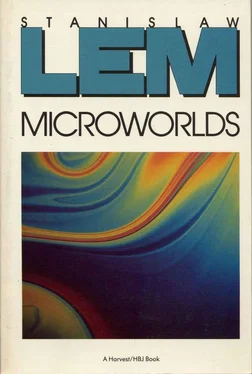Lem’s relationship with science fiction is a love-hate relationship. Although much of his writing can only be called science fiction, for a long time Lem was not familiar with what other science-fiction writers were doing (he has often declared that he lived in Poland like Robinson Crusoe on his island). Verne and Wells he read in his youth, but modern Western science fiction was unknown to him until the late 1950s, when he read some of it, mostly in French translation, following his publication in France by Denoël. Only much later was he able to read more widely, and the more science fiction he read, the more he was disappointed. This disappointment is reflected in many of his autobiographical pieces and, of course, in his criticism. In the late sixties, Lem decided to put his ideas about science fiction into systematic form. The result was Fantastyka i futurologia, a major study of Western science fiction.
For a time Lem played the part of a missionary in the science-fiction world, but today he feels he was wasting his time trying to reform science fiction by criticism, and he has virtually stopped writing about it (and reading it), although he still contributes occasionally to publications like Science-Fiction Studies. To judge from the reaction to Lem’s essays, few understood him. But some people at least seem to have understood him: in 1976 the Science Fiction Writers of America revoked Lem’s honorary membership, following publication by an American press service of excerpts from an article of his in a German newspaper, sharply critical of science fiction. Officially, Lem’s membership was withdrawn on technical grounds. Had Lem been less critical of science fiction, of course, the SFWA officers would have had no reason to read the bylaws of their own organization, and Lem would not have been treated so shabbily. (The whole affair is documented in Science-Fiction Studies, July 1977 ff.)
A Polish reviewer has remarked that Lem is not interested in literature per se at all; his main interest is in the structure of the world, not the structure of the literary work. Lem is more interested in intellectual problems than in their literary expression. He has no patience with the notion of fiction as entertainment or art for art’s sake, and fiction without intellectual problems bores him. He is filled with curiosity about what is not yet known. For him, science fiction is a laboratory for trying out experiments in new ways of thinking; it should be a spearhead of cognition. It should attempt what hasn’t been thought or done before.
These goals are of course impossible to achieve, let alone in a literature of mass entertainment. Lem sees science fiction as literature with great potential — a potential that naïve apologists often claim has already been achieved — and he is all the more disappointed that it falls so far short of his expectations. He complains that it is only a rehash of old myths and fairy tales, that it avoids all kinds of real problems, and that it resorts to narrative patterns of primitive adventure literature, which are wholly inadequate to express what is claimed for science fiction. For him, science fiction plays “empty games” — the tired old vaudeville of time travel, robots, supermen, mutants, extrasensory perception, and the rest.
From this disappointment comes the polemical acerbity of Lem’s writings on science fiction. He believes in old-fashioned cultural and intellectual virtues, which he sees threatened by the onslaught of mass culture. Science fiction is a traitor to those values; even worse, it often claims to possess those values when it does not, quite unlike more modest forms of popular fiction. One of Lem’s recurrent nightmares is the flood of information whose sheer volume makes it extremely difficult, if not impossible, to find the few good works in the mass of the bad. Such a leveling effect he also attributes to structuralism, one of his main targets.
It is Lem’s concern for the real world and its cultural heritage that explains the sharpness of his tone, for he writes in a tradition where cultural values matter. Lem does not have to denigrate “Western science fiction” in order to ingratiate himself with the Polish authorities, as one of the sillier opinions once current among American science-fiction writers had it. Nor does it follow, from the fact that Lem’s criticisms in Fantastyka i futurologia deal mostly with American and English science fiction, that he likes the Soviet variety any better. It is only that it would be more difficult for a citizen of Poland to write serious criticism about Soviet science fiction, not because it couldn’t be published, but rather because objective discussion of the better works would be fraught with dangers for the writers discussed. Nevertheless, the present collection includes an analysis of one of the most brilliant examples of modern Soviet science fiction, Roadside Picnic, by the Strugatsky brothers, originally published as an afterword to a Polish edition in a series entitled “Lem Recommends.” (The series included Philip K. Dick’s Ubik — Lem’s afterword is also printed here — and short story collections by M. R. James and by the Polish weird fiction writer Stefan Grabiliski, as well as Ursula K. Le Guin’s Wizard of Earthsea. )
All the essays in this volume have been published before, and the selection presented here was made entirely from existing translations. The magazines in which they first appeared range from science-fiction fanzines to Science-Fiction Studies and The New Yorker. Some were written originally in German; two came into English via Hungarian and German, respectively. Of some essays, such as the one on Borges, there is no Polish version; one, “Todorov’s Fantastic Theory of Literature,” was originally written in German, later rewritten in Polish by the author himself, and then translated from Polish to English. The autobiographical essay was commissioned by a Chicago publisher for a series on contemporary authors. It was written by Lem in German and published in my translation. A somewhat different version appeared in The New Yorker, as “Chance and Order.”
Despite the mixed origins of the essays and the many hands involved in giving them their final shape, I think that this collection has a remarkable unity and can serve as a useful introduction to Lem’s nonfiction and to his ideas on science fiction and fantasy. It should contribute to a better understanding of Lem’s unique fiction, so much different in scope from other science fiction even when it uses the same forms.
Special thanks are due to all the people who first published these essays, especially to Bruce Gillespie, whose Science Fiction Commentary was in its day one of the liveliest and most open of the many fan magazines in the science-fiction field.
— Franz Rottensteiner
As I write this autobiographical essay, I am aware of two opposed principles that guide my pen. One of those two extremes is chance; the other is the order that gives shape to life. Can all the factors that were responsible for my coming into the world and enabled me, although threatened by death many times, to survive unscathed in order finally to become a writer — moreover, one who ceaselessly strives to reconcile contradictory elements of realism and fantasy — be regarded only as the result of long chains of chance? Or was there some specific predetermination involved, not in the form of some supernatural moira, not quite crystallized into fate when I was in my cradle but in a budding form laid down in me — that is to say, in my genetic inheritance was there a kind of predestiny befitting an agnostic and empiricist?
Читать дальше












